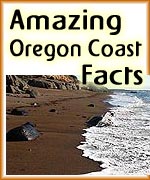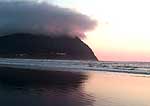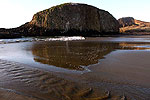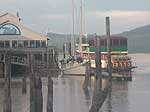 |
Published 12/10/2009
Large Squid Strand on Oregon Coast, Then Freeze
 |
| Seaside Aquarium's Tiffany Boothe poses with a squid as tall as she is. (Photo Seaside Aquarium) |
(Seaside, Oregon) – A large number of Humboldt Squid are stranding on Oregon beaches and then becoming frozen in the sand because of temperatures in the 20’s along the coast. Not only are they remaining intact but many of them are almost gigantic.
Staff from Seaside Aquarium have received reports of dozens of them washing up, coming in from Pacific City all the way up to Sunset Beach near Warrenton – around 100 miles worth of squid sightings.
Aquarium staff found 16 of them Wednesday, then received reports of around 12 in Seaside and another 12 around Gearhart. The first reports came in on Monday as a man in Pacific City called the aquarium. Staff again hit the beaches on Thursday to look for more and expect to find even greater numbers.
Tiffany Boothe, with the Seaside Aquarium, said many of the squid were four feet to five feet in length and around 25 pounds. At just a tad over five feet high herself, some of the squid were almost as tall as she is – and she photographed a comparison to prove it.
 |
| A frozen squid on the beach (photo Seaside Aquarium) |
One was still alive when she found it on Wednesday, Boothe said. It died quickly after, however.
They remaining remarkably intact because they’re freezing in pools of frozen seawater wherever they land. Also, the local population of shorebirds has not picked them clean, which is unusual because they normally go for the eyes immediately. Eyes are a kind of delicacy for seagulls and such.
“We don’t really know why the birds didn’t go for these,” Boothe said. “They just don’t seem interested. But we think it’s because it’s winter, so there’s fewer birds out there, and there’s been a lot of crabs and other interesting things for them to eat wash up because of storms.”
Boothe said the beaches are so cold the squid freeze to the sand where they finally settle. “They’re leaving these really neat squid prints,” she said.
 |
| Squid prints frozen in the sand (photo Seaside Aquarium) |
Not native to this area, Humboldt squid reside in the warmer waters off of the California coast. “Every once in a while, a warm water current that runs off shore will bring these squid up north,” Boothe said. “Eventually the warm water current will dissipate, leaving the squid in water far too cold for them. The squid then get hypothermia and start to wash ashore.”
She said this current is probably the dynamic that brought two sea turtles onshore last week as well.
While this sort of occurrence is rather unusual, something like this does happen about once a year, often with squid. Last year, in October of ’08, hundreds of them stranded on the north Oregon coast, and hundreds more on the Washington coast.
 |
| Near Pacific City, where some squid were found. |
While these may be frozen and intact, aquarium manager Keith Chandler warns to not even think about eating one of these off the beach. You don’t know how long they’ve been dead and decaying, and the results of consuming them could be deadly.
“Eating something dead off the beach is never a healthy thing to do,” Chandler said. “If you found a dead possum on the road, would you eat it?"
Brandon Ford, with the Newport office of Oregon Fish and Wildlife Department, said while these are not suitable for human consumption, the fact they’re frozen will likely make them great for crab bait.
More About Oregon Coast.....
 |
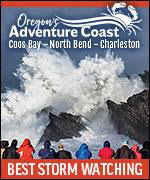 |
 |
 |
RELATED STORIES
Unusual Travel Articles TravelParanormal.com allows you to submit your own creepy tale or debunk one - or see up-to-the-minute news headlines about travel and the paranormal.
Watching Transformations of Oregon Coast Beaches Seasons change and so do beaches, revealing different sides and a variety of eye-popping sights
Staggeringly Cool Ideas for Oregon Coast Romance Be it the season of Valentine's or be it any time of the year, Oregon's coastline has essentially cornered the market for cuddle-inducing possibilities and gushy activities for the hand-holding set
Day or Night Mysteries and Merriment on Oregon Coast It's more than just nightlife that comes to life, but the beaches offer major opportunities
News Headlines from All Over Oregon Need to scan Oregon headlines? Constantly updated news from all over Oregon: a comprehensive, up-to-the-minute display of news headlines from a variety of media.
Secrets of the Season |




















